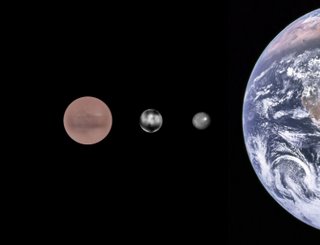My Very Energetic Mother Claire...
Today, the IAU held a discussion on whether or not to include three heavenly bodies into the often uncertainclassification of planet. The results? Well, kids are going to have some extra homework in 5th grade science classes to be sure.
 The three "potential planets", shown in comparison of size to the Earth, are from Left to Right,
The three "potential planets", shown in comparison of size to the Earth, are from Left to Right,
2003 UB_313 monikered as "Xena", Charon the "moon" of Pluto, and Ceres in the Main Asteriod Belt.
There are multiple reasons for astronomers and astropyhsists to rethink their views on what continues a planet or not. The IAU has held specific criteria as to what constitutes a planet for quite a long time. The proposed resolution on planets would rethink this definition by stating in part that:
Currently, in our solar system there are nine planets. If the new definition is applied tomorrow we will jump up to twelve planets in total that orbit our sun.
So here's to all that look up from Earth and see more than a vast array of pinpoints. They dream of marvels to discover, and are held back only by their imaginations.
 The three "potential planets", shown in comparison of size to the Earth, are from Left to Right,
The three "potential planets", shown in comparison of size to the Earth, are from Left to Right,2003 UB_313 monikered as "Xena", Charon the "moon" of Pluto, and Ceres in the Main Asteriod Belt.
There are multiple reasons for astronomers and astropyhsists to rethink their views on what continues a planet or not. The IAU has held specific criteria as to what constitutes a planet for quite a long time. The proposed resolution on planets would rethink this definition by stating in part that:
"A planet is a celestial body that (a) has sufficient mass for its self-gravity to overcome rigid body forces so that it assumes a hydrostatic equilibrium (nearly round) shape, and (b) is in orbit around a star, and is neither a star nor a satellite of a planet." Member of the Planet Definition Committee, Richard Binzel says: "Our goal was to find a scientific basis for a new definition of planet and we chose gravity as the determining factor. Nature decides whether or not an object is a planet."In simple terms, if scientists know that an object is able to be considered a planet it has an atmosphere, a specific gravity unto itself, a mass to create its own geosynchronous rotation on an axis which also forms it into a mostly spherical shape, is proximal enough to a star to remain within its gravitational pull ... essentially, a planet has the characteristics needed to have previously supported or could potentially support life in some form. The importance of this definition is that if scientists think something is a planet, then it receives a great deal more attention when it comes to the primary goal of space exploration: to find extraterrestrial life. Whether its in the form of microbiocia or simple hydrocarbon water life, this and an inherent need to understand the make-up of the universe and our place within it make this activity all the more important.
Currently, in our solar system there are nine planets. If the new definition is applied tomorrow we will jump up to twelve planets in total that orbit our sun.
So here's to all that look up from Earth and see more than a vast array of pinpoints. They dream of marvels to discover, and are held back only by their imaginations.







<< Home